
England is a country that is part of the United Kingdom. It is located on the island of Great Britain, of which it covers about 62%, and more than 100 smaller adjacent islands. It has land borders with Scotland to the north and Wales to the west, and is otherwise surrounded by the North Sea to the east, the English Channel to the south, the Celtic Sea to the south-west, and the Irish Sea to the west. Continental Europe lies to the south-east, and Ireland to the west. At the 2021 census, the population was 56,490,048. London is both the largest city and the capital.

The English Civil War was a series of civil wars and political machinations between Royalists and Parliamentarians in the Kingdom of England from 1642 to 1651. Part of the wider 1639 to 1653 Wars of the Three Kingdoms, the struggle consisted of the First English Civil War and the Second English Civil War. The Anglo-Scottish War of 1650 to 1652 is sometimes referred to as the Third English Civil War.

The Glorious Revolution, also known as The Revolution of 1688, was the deposition of James II and VII in November 1688. He was replaced by his daughter Mary II, and her Dutch husband, William III of Orange, who was also James's nephew and had an interest in the throne in his own right. The two ruled as joint monarchs of England, Scotland, and Ireland until Mary's death in 1694, when William became ruler in his own right. Jacobitism, the political movement that aimed to restore the exiled James or his descendants in the House of Stuart to the throne, persisted into the late 18th century. William's invasion was the last successful invasion of England.

Oliver Cromwell was an English statesman, politician, and soldier, widely regarded as one of the most important figures in British history. He came to prominence during the Wars of the Three Kingdoms, initially as a senior commander in the Parliamentarian army and latterly as a politician. A leading advocate of the execution of Charles I in January 1649, which led to the establishment of the Commonwealth of England, he ruled as Lord Protector from December 1653 until his death in September 1658.
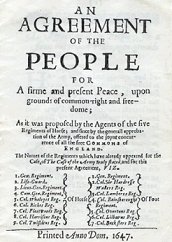
The Levellers were a political movement active during the English Civil War who were committed to popular sovereignty, extended suffrage, equality before the law and religious tolerance. The hallmark of Leveller thought was its populism, as shown by its emphasis on equal natural rights, and their practice of reaching the public through pamphlets, petitions and vocal appeals to the crowd.
The Whigs were a political party in the Parliaments of England, Scotland, Ireland, Great Britain and the United Kingdom. Between the 1680s and the 1850s, the Whigs contested power with their rivals, the Tories. The Whigs became the Liberal Party when the faction merged with the Peelites and Radicals in the 1850s. Many Whigs left the Liberal Party in 1886 over the issue of Irish Home Rule to form the Liberal Unionist Party, which merged into the Conservative Party in 1912.
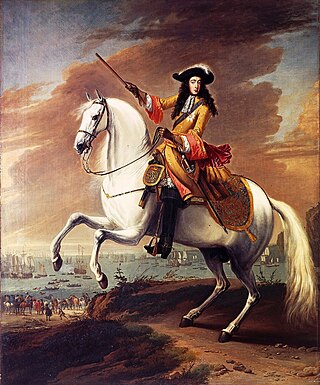
The English Revolution is a term that has been used to describe two separate events in English history. Prior to the 20th century, it was generally applied to the 1688 Glorious Revolution, when James II was deposed and a constitutional monarchy established under William III and Mary II.

The London Corresponding Society (LCS) was a federation of local reading and debating clubs that in the decade following the French Revolution agitated for the democratic reform of the British Parliament. In contrast to other reform associations of the period, it drew largely upon working men and was itself organised on a formal democratic basis.

John Wilkes was an English radical journalist and politician, as well as a magistrate, essayist and soldier. He was first elected a Member of Parliament in 1757. In the Middlesex election dispute, he fought for the right of his voters – rather than the House of Commons – to determine their representatives. In 1768, angry protests of his supporters were suppressed in the Massacre of St George's Fields. In 1771, he was instrumental in obliging the government to concede the right of printers to publish verbatim accounts of parliamentary debates. In 1776, he introduced the first bill for parliamentary reform in the British Parliament.
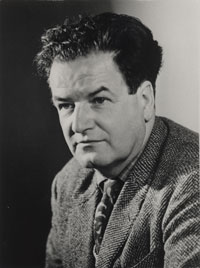
John Edward Christopher Hill was an English Marxist historian and academic, specialising in 17th-century English history. From 1965 to 1978 he was Master of Balliol College, Oxford.
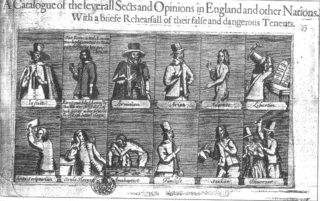
The Seekers, or Legatine-Arians as they were sometimes known, were an English dissenting group that emerged around the 1620s, probably inspired by the preaching of three brothers – Walter, Thomas, and Bartholomew Legate. Seekers considered all organised churches of their day corrupt and preferred to wait for God's revelation. Many of them subsequently joined the Religious Society of Friends (Quakers).

The Parliament of Great Britain was formed in May 1707 following the ratification of the Acts of Union by both the Parliament of England and the Parliament of Scotland. The Acts ratified the treaty of Union which created a new unified Kingdom of Great Britain and created the parliament of Great Britain located in the former home of the English parliament in the Palace of Westminster, near the City of London. This lasted nearly a century, until the Acts of Union 1800 merged the separate British and Irish Parliaments into a single Parliament of the United Kingdom with effect from 1 January 1801.
The Society of the Friends of the People was an organisation in Great Britain that was focused on advocating for parliamentary reform. It was founded by the Whig Party in 1792.

Anarchism in the United Kingdom initially developed within the religious dissent movement that began after the Protestant Reformation. Anarchism was first seen among the radical republican elements of the English Civil War and following the Stuart Restoration grew within the fringes of radical Whiggery. The Whig politician Edmund Burke was the first to expound anarchist ideas, which developed as a tendency that influenced the political philosophy of William Godwin, who became the first modern proponent of anarchism with the release of his 1793 book Enquiry Concerning Political Justice.

The Wars of the Three Kingdoms were a series of conflicts fought between 1639 and 1653 in the kingdoms of England, Scotland and Ireland, then separate entities in a personal union under Charles I. They include the 1639 to 1640 Bishops' Wars, the First and Second English Civil Wars, the Irish Confederate Wars, the Cromwellian conquest of Ireland and the Anglo-Scottish War of 1650–1652. They resulted in the execution of Charles I, the abolition of monarchy, and founding of the Commonwealth of England, a unitary state which controlled the British Isles until the Stuart Restoration in 1660.

Whiggism or Whiggery is a political philosophy that grew out of the Parliamentarian faction in the Wars of the Three Kingdoms (1639–1653) and was concretely formulated by Lord Shaftesbury during the Stuart Restoration. The Whigs advocated the supremacy of Parliament, government centralization, and coercive Anglicisation through the educational system. They also staunchly opposed granting freedom of religion, civil rights, or voting rights to anyone who worshipped outside of the Established Churches of the realm. Eventually, the Whigs grudgingly conceded strictly limited religious toleration for Protestant dissenters, while continuing the religious persecution and disenfranchisement of Roman Catholics and Scottish Episcopalians. They were particularly determined to prevent the ascension of a Catholic heir presumptive to the British throne, especially of James II or his legitimate male descendants and instead granted the throne to the Protestant House of Hanover in 1714. Whig ideology is associated with early conservative liberalism.
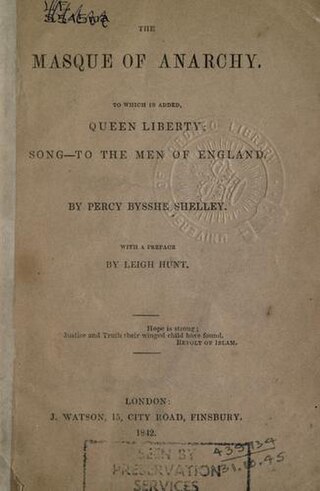
The Masque of Anarchy is a British political poem written in 1819 by Percy Bysshe Shelley following the Peterloo Massacre of that year. In his call for freedom, it is perhaps the first modern statement of the principle of nonviolent resistance.

The revolutions of 1848, known in some countries as the springtime of the peoples or the springtime of nations, were a series of revolutions throughout Europe over the course of more than one year, from 1848 to 1849. It remains the most widespread revolutionary wave in European history to date.

The Root and Branch Petition was a petition presented to the Long Parliament on 11 December 1640. The petition had been signed by 15,000 Londoners and was presented to the English Parliament by a crowd of 1,500. The petition called on Parliament to abolish episcopacy from the 'roots' and in all its 'branches'.
Far-left politics, also known as extreme left politics or left-wing extremism, are politics further to the left on the left–right political spectrum than the standard political left. The term does not have a single, coherent definition; some scholars consider it to be the left of communist parties, while others broaden it to include the left of social democracy. In certain instances—especially in the news media—far left has been associated with some forms of authoritarianism, anarchism, communism, and Marxism, or are characterized as groups that advocate for revolutionary socialism and related communist ideologies, or anti-capitalism and anti-globalization. Far-left terrorism consists of extremist, militant, or insurgent groups that attempt to realize their ideals through political violence rather than using democratic processes.
















